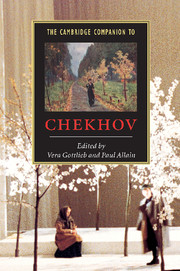Book contents
- Frontmatter
- Part 1 Chekhov in context
- Part 2 Chekhov in production
- 4 From Platonov to Piano
- 5 Chekhov's one-act plays and the full-length plays
- 6 Ivanov: the invention of a negative dramaturgy
- 7 The Seagull: an adaptation
- 8 Notes from a director: Uncle Vanya
- 9 Notes from a director: Three Sisters
- 10 The Cherry Orchard
- 11 Acting Chekhov: 'a friend to the actor'
- 12 The scenography of Chekhov
- 13 Chekhov on screen
- 14 Chekhov on the Russian stage
- 15 Directors' Chekhov
- Part 3 Chekhov the writer
- Appendix 1 Chekhov's works: primary sources from the Russian - Variations of English titles from the Russian
- Appendix 2 Selected stage productions
- Appendix 3 Selected screen versions
- Appendix 4 Illustrations
- Selected bibliography
- Index of Works by Checkov
- General Index
4 - From Platonov to Piano
from Part 2 - Chekhov in production
Published online by Cambridge University Press: 28 May 2006
- Frontmatter
- Part 1 Chekhov in context
- Part 2 Chekhov in production
- 4 From Platonov to Piano
- 5 Chekhov's one-act plays and the full-length plays
- 6 Ivanov: the invention of a negative dramaturgy
- 7 The Seagull: an adaptation
- 8 Notes from a director: Uncle Vanya
- 9 Notes from a director: Three Sisters
- 10 The Cherry Orchard
- 11 Acting Chekhov: 'a friend to the actor'
- 12 The scenography of Chekhov
- 13 Chekhov on screen
- 14 Chekhov on the Russian stage
- 15 Directors' Chekhov
- Part 3 Chekhov the writer
- Appendix 1 Chekhov's works: primary sources from the Russian - Variations of English titles from the Russian
- Appendix 2 Selected stage productions
- Appendix 3 Selected screen versions
- Appendix 4 Illustrations
- Selected bibliography
- Index of Works by Checkov
- General Index
Summary
Unlikely as it might seem today, the appearance in 1923 of a previously unpublished and untitled play by Chekhov seems to have aroused little interest in Russia outside literary circles. However, it is not surprising that it was ignored by the Soviet theatre of that time. Firstly, Chekhov was about the last dramatist likely to excite the new revolutionary avant-garde. Secondly, the Moscow Art Theatre was still in the grip of the artistic paralysis to which it had been reduced by the events of 1917, and seventeen more years were to elapse before it staged a new production of Chekhov. Finally, the prospect of a ramshackle text almost three times the length of any other Chekhov play would have deterred most theatres even at the best of times. In fact, it was not until 1957 that the work received its Russian premiere, though by that time it had been staged around the world in various versions and under a curious variety of titles.
- Type
- Chapter
- Information
- The Cambridge Companion to Chekhov , pp. 43 - 56Publisher: Cambridge University PressPrint publication year: 2000
- 1
- Cited by

